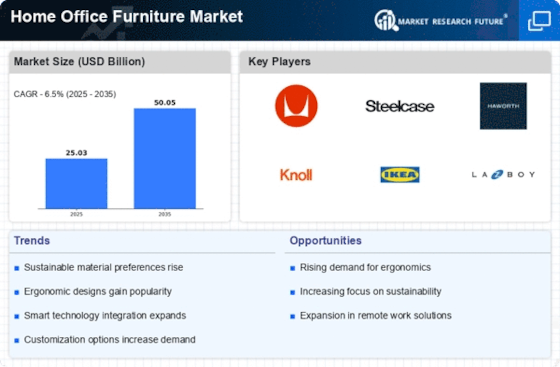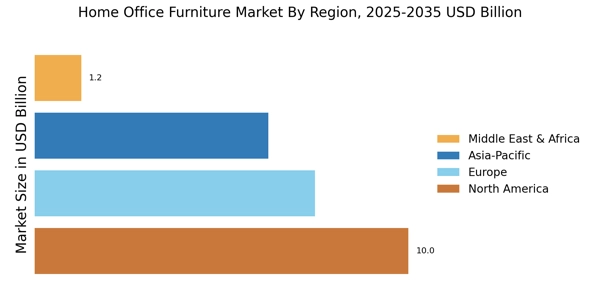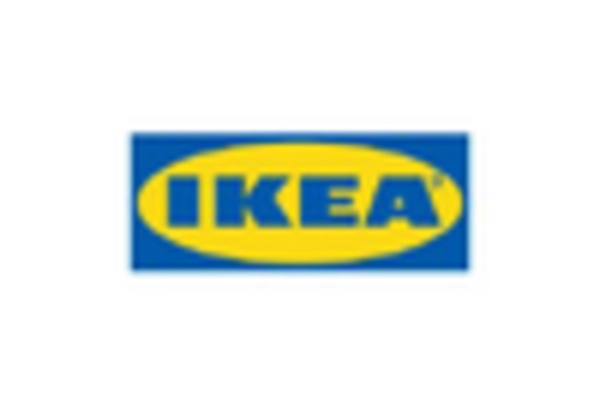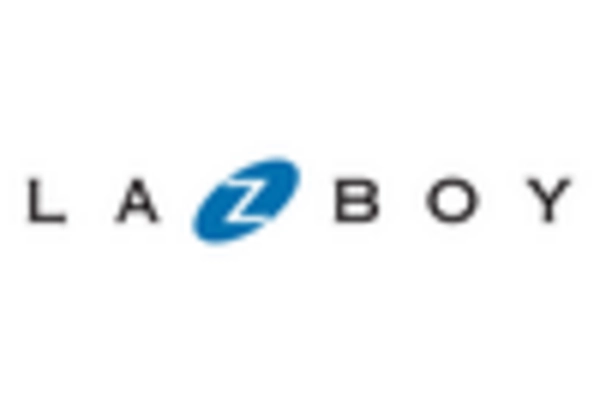Rise of Remote Work
The increasing prevalence of remote work arrangements appears to be a primary driver for the Home Office furniture Market. As more individuals transition to working from home, the demand for dedicated office spaces within residences has surged. This shift necessitates the acquisition of appropriate furniture, including desks, chairs, and storage solutions. Recent data indicates that approximately 30% of the workforce is now engaged in remote work, which has led to a notable increase in home office furniture sales. Consequently, manufacturers are responding by innovating and expanding their product lines to cater to this growing segment, thereby enhancing the overall market landscape.
Sustainability Trends
The increasing emphasis on sustainability and eco-friendly practices seems to be a significant driver in the Home Office Furniture Market. Consumers are becoming more aware of the environmental impact of their purchases, leading to a preference for furniture made from sustainable materials. This trend has prompted manufacturers to adopt greener production methods and source materials responsibly. Recent statistics indicate that sales of sustainable office furniture have increased by 18%, reflecting a shift in consumer values. As the demand for environmentally friendly products continues to rise, manufacturers are likely to innovate further, ensuring that sustainability remains a core focus in the development of home office furniture.
Technological Integration
The integration of technology into home office setups seems to be influencing the Home Office Furniture Market significantly. As individuals increasingly rely on digital tools for their work, furniture that accommodates technology becomes essential. This includes desks with built-in cable management systems, adjustable height features for standing desks, and ergonomic chairs designed for prolonged use. Market data suggests that the demand for tech-friendly furniture has risen by over 25% in recent years, reflecting a shift in consumer preferences. Manufacturers are likely to continue developing products that seamlessly blend functionality with technological needs, thereby driving market growth.
Health and Wellness Awareness
The growing awareness of health and wellness among consumers appears to be a crucial factor propelling the Home Office Furniture Market. As individuals become more conscious of the impact of their work environment on physical and mental well-being, there is an increasing demand for ergonomic furniture solutions. Research indicates that ergonomic chairs and desks can reduce the risk of musculoskeletal disorders, which has led to a surge in their popularity. The market for ergonomic office furniture has expanded significantly, with sales projected to grow by 15% annually. This trend suggests that consumers are willing to invest in furniture that promotes a healthier work environment, thereby influencing purchasing decisions.
Customization and Personalization
The desire for customization and personalization in home office spaces appears to be shaping the Home Office Furniture Market. Consumers increasingly seek furniture that reflects their individual styles and meets their specific functional needs. This trend has led to a rise in demand for modular furniture solutions that can be tailored to fit various spaces and preferences. Market analysis indicates that customizable furniture options have seen a growth rate of approximately 20%, as consumers prioritize unique designs and configurations. Manufacturers are responding by offering a wider range of customizable products, thereby enhancing consumer engagement and driving market expansion.

















